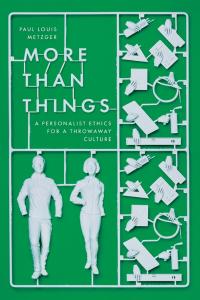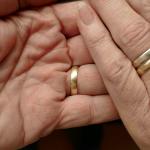
None of us wants to be treated as a thing. But we struggle to treat one another as persons. It is very difficult to discern what a person is when what we do, what we wear, what we own, and in some cases, who we own, generates our sense of value rather than who we are. We live in what Pope Francis referred to as a “throwaway culture.” A throwaway culture cheapens human persons as tools to use or commodities to buy and sell and then discard. Why settle for less when God has made us for more? People are far more important than things. Let’s live as people, not things. Let’s not throw ourselves away by treating one another as stuff, tools, and gadgets to use and discard. Let’s throw ourselves into the work of treating one another and ourselves as persons.
We find concerns over the reduction of persons to things in pop culture. Consider Netflix’s series, Ozark, where a drug lord tells Wendy that they are not business partners. He lets her know in no uncertain terms that she exists for him to use. He owns her.
Consider, too, Macklemore’s line in “Wing$,” as he laments how youth kill one another for a coveted pair of Air Jordans: people are what they wear and wear what they are.
Then there is the movie Her, where the state-of-the-art AI operating system controls Joaquin Phoenix’s character’s various devices. As the device known as Samantha grows in consciousness, it is used by the corporation that manufactured “her” to control him. It logs their conversations and downloads his various emotions and values for research, development, and profit.
It is not simply pop culture that reflects this framework. We also find it as a pressing matter of concern in the academic sphere and public square. It is not so much a matter of viewing things as persons, but treating persons as things, as famed literary critic Barbara Johnson has argued. She writes in Persons and Things, “The more I thought about the asymptomatic relation between things and persons, the more I realized that the problem is not, as it seems, a desire to treat things as persons, but a difficulty in being sure that we treat persons as persons . . . Rather than trying to invent a humanoid thing capable of passing ever more sophisticated Turing tests, in other words, our real impossible dream is precisely to learn to live in a world where persons treat persons as persons.”
My son Christopher has taught me a thing or two about the need to treat persons as persons. When he was a child, he and his friend Daniel used to get together and play once a week.
I still remember the time when I instructed Christopher to make sure that he and Daniel kept their bikes away from the Toyota Camry in the garage so they wouldn’t scratch the car with the bike handles. While they played, I spent the afternoon prepping the house exterior for painting.
I came inside in the evening, long after the boys had parted company. My wife realized how exhausted I was and graciously offered to bring dinner to me on the back porch. As she handed me my plate of food, she said, “By the way, the boys accidentally scratched the car in the garage with their bikes.” In spite of my exhaustion, I instantaneously experienced an adrenalin surge. I went back into the house and said the following to my son in an exasperated tone, “Christopher, I told you to keep the bikes away from the car in the garage!” Christopher responded in a calm, measured manner: “Dad, people are more important than cars.” Ouch! Christopher wasn’t justifying their lack of attentiveness to my instruction. It was simply a matter of him recognizing that his father’s passion for the car did not match the value system I espouse.
I will never forget the lesson I learned that day. My son taught me existentially something I knew intellectually: people are far more important than cars and other things.
Since that time, I have invested many years of my life trying to come to terms with this challenge and to join others in seeking to move from a culture of things to a culture of persons. The search is by no means merely academic, but deeply personal. It took on dramatic, even traumatic, significance on January 21, 2021.
My beloved son Christopher, who is married with a small child, endured a catastrophic brain injury that January day. He is now completely dependent on others in his minimally conscious state. Even so, he is a person, with all the dignity that personhood entails. That is why I take special note of whether caregivers talk to him and call him by name rather than treat him as an automaton. My son is a person, not a thing, and often responds rather than reacts to personal connection.
Such personal connection was definitively on display the other night when my wife visited our son. Christopher’s first language is Japanese. That is, my wife who has been with him from first to last has almost always spoken to Christopher in Japanese, from the cradle to his care facility bedside. On Sunday evening, she spoke playfully to him in Japanese, while touching his arm: “Okaasan, Otousan, Kyōdai no daiji na hito (“You are mother’s, father’s, sibling’s important person.”). Christopher started beaming when my wife spoke these words to him. Love is their native language. He quickly took the comb she gave him, awkwardly holding it in place between his thumb and fingers. He moved it to his head before dropping it. He quickly tried again to comb his hair when his mother repeated the exercise. What stood out to my wife was the beaming smile and the speed with which Christopher responded in trying to comb his hair. There’s nothing like a mother’s secure attachment to motivate a child to positive action so quickly.
Dr. Martin Luther King, Jr., was also raised in a loving home and was shaped to believe in a divine benevolent personal force in the universe, who provides the utmost sense of worth and secure attachment. King was one of the greatest personalists of the twentieth century. You find this personalism on display in his Vietnam War sermon in April 1967. He reasoned in “Beyond Vietnam”: “I am convinced that if we are to get on to the right side of the world revolution, we as a nation must undergo a radical revolution of values. We must rapidly begin . . . the shift from a thing-oriented society to a person-oriented society. When machines and computers, profit motives and property rights, are considered more important than people, the giant triplets of racism, extreme materialism, and militarism are incapable of being conquered.”
Humans are more than biological and sexual drives, market forces, consumer appetites, or cogs in a machine. If we prefer to focus on such things as the choices, functions, and exchanges we make as humans, or the appetites and interests we express, but not on the human persons who make rational choices, who function in various social systems, who exchange goods and services involving cost-benefit analysis, and who express certain tastes and cravings, we will never find personhood on the human or divine level. But if that’s the case, why should we be concerned with human rights and human emancipation? If we were consistent, we would seek to secure bureaucratic governmental authority and corporate shareholders’ interests over the human masses at every turn (I am indebted to Christian Smith’s critical analysis of non-personalist enquiries in the social sciences in What Is a Person?).
Why settle for less when God has made us for more? People are far more important than things. Let’s live as people, not things. Let’s not throw ourselves away by treating one another as stuff, tools, and gadgets to use and discard. Let’s throw ourselves into the work of treating one another and ourselves as persons.
So, what is a person? I thought you’d never ask! I argue in my latest book, More Than Things: A Personalist Ethics for a Throwaway Culture, that the concept of human personhood entails such qualities as human agency and individual freedom for relationship with others. The doctrine of human personhood involves an expansive and emerging sense of one’s embodied self, including spiritual energy. This teaching affirms every person’s incommunicable and unrepeatable identity, inviolability, and dignity. All humans are persons. As such, they are mysterious and unique subjects with inherent worth and the right to self-determination in fostering vital community.
Personalism is an ethic that perceives the person (both divine and human) as the primary unit of value in any ethical consideration. Also, personalism claims that each human person is unique and irreplaceable, has infinite dignity and worth, and that we must never treat one another as mere instruments or means. Rather, all persons are ends in themselves in vital relation to others.
Let’s develop this line of inquiry further by reflecting on persons as unfathomable, untouchable, and unrepeatable:
You are unfathomable. No one knows you like God knows you. You are no mere mortal. Let us no longer look at anyone from a merely human point of view (2 Corinthians 5:16). Here’s what C.S. Lewis writes about the subject in The Weight of Glory:
The load, or weight, or burden of my neighbour’s glory should be laid on my back, a load so heavy that only humility can carry it, and the backs of the proud will be broken. It is a serious thing to live in a society of possible gods and goddesses, to remember that the dullest and most uninteresting person you can talk to may one day be a creature which, if you say it now, you would be strongly tempted to worship, or else a horror and a corruption such as you now meet, if at all, only in a nightmare. All day long we are, in some degree, helping each other to one or other of these destinations. It is in the light of these overwhelming possibilities, it is with the awe and the circumspection proper to them, that we should conduct all our dealings with one another, all friendships, all loves, all play, all politics. There are no ordinary people. You have never talked to a mere mortal. Nations, cultures, arts, civilisations—these are mortal, and their life is to ours as the life of a gnat. But it is immortals whom we joke with, work with, marry, snub, and exploit—immortal horrors or everlasting splendours.
Just think what difference it would make to our various forms of interaction with other people if we approached them from this point of view. Social media platforms would become occasions for truly social rather than anti-social behavior, as would our political and cultural discourse more broadly. Let’s not quickly minimize one another as disgusting and despicable based on their past actions, affiliations, and persuasions, or quickly sum people up and spit them out of our mouths as self-fulfilling prophecy losers.
To move beyond such insecure, detached, problematic outlooks and behaviors, we will need to grow in secure attachment. We will need to approach others and ourselves in view of a more noble outlook. As God’s masterpiece of creation, you are unfathomable, infinite in worth.
You are untouchable. In other words, no matter how much others tear away and violate you, your personhood is inviolable. So, in keeping with what Victor Frankl wrote, no matter how much the Nazis could take away from him, they could not take away his freedom to respond in affirmation of his dignity and worth as a person. So, do not react. Be proactive. Do not lose yourself or allow others to take away your sense of infinite worth. Dare to respect yourself as made in the divine image! Dare to respect others made in God’s image, too!
You are unrepeatable. In other words, God broke the mold in making each of you. Learn from others, but don’t be copycats. You are not cogs in a machine. You are made for more as persons in communion. So, be genuine, not generic. Dare to be you before the Lord! Dare to encourage others to be who they are before the Lord!
If we are unfathomable, untouchable, and unrepeatable, why settle for less when God has made us for more? People are far more important than things. And yet, contemporary culture often reduces us to things.
Modernity has generated a historiography of crisis for human worth and value. Sigmund Freud was a masterful storyteller, whose faulty historiography still reigns supreme in many quarters. He celebrated the fact that humanity was no longer at the center of the universe in view of Copernicus, Darwin, and his own psychoanalytical theory: humanity and the earth are no longer the center of the universe; humanity is no longer unique and set apart as special as a species according to evolutionary development; and humans are not even in control of their own heads, as so much more is going on below the surface of consciousness. A case can be made that this sense of loss is what has made humans Frankenstein’s monsters in the modern era, far more than any seeming outdated medieval outlook, as we try to control the universe and one another.
We do not have opportunity in this space to reflect at length on Freud’s faulty historiography involving Copernicus and Darwin. For now, it is simply worth noting that according to Aristotle and Dante, being at the center of the universe is hardly a flattering notion. Dennis R. Danielson argues that the geocentric universe did not paint the world in the most endearing light, neither for Aristotle, nor Aristotle’s great Christian sympathizer, theologian Thomas Aquinas. Centrality meant heaviness and grossness, not greatness. In fact, the very center of the universe was the earth’s center point, which is the lowest pit of hell in Dante’s Inferno.
Interestingly, the Bible does not project humanity as the center of the universe. For example, Psalm 8 makes clear that humanity’s significance in comparison with the heavens in all their grandeur is not our relative greatness. Rather, we are so small and insignificant in comparison. It is not a matter of how great we are, but rather, how great God’s love and affection for us is: “When I consider your heavens, the work of your fingers, the moon and the stars, which you have set in place, what is mankind that you are mindful of them, human beings that you care for them? You have made them a little lower than the angels and crowned them with glory and honor” (Psalm 8:3-5; NIV). We do not need to be at the center of the universe to be at the center of God’s affection. God’s abiding affection and affirmation are what provide security.
Hebrews 2 builds on this theme by bringing Jesus to bear on the discussion. The author quotes from Psalm 8 and frames it Christologically:
It is not to angels that he has subjected the world to come, about which we are speaking. But there is a place where someone has testified:
“What is mankind that you are mindful of them,
a son of man that you care for him?
You made them a little lower than the angels;
you crowned them with glory and honor
and put everything under their feet.”In putting everything under them, God left nothing that is not subject to them. Yet at present we do not see everything subject to them. But we do see Jesus, who was made lower than the angels for a little while, now crowned with glory and honor because he suffered death, so that by the grace of God he might taste death for everyone. (Hebrews 2:5-9; NIV)
The Hebrews text informs us that God has subjected everything to humanity. And yet, there is this gaping hole between what God has intended will take place and what is presently playing out in human history: “At present, we don’t see everything subjected to humanity.”
But the author does not end on a down note, but hopeful crescendo: “But we see Jesus!”
At present, what do we see? We often see humans subject to racism, economic exploitation, and militarism.
But let us not lose faith, hope, and love. It is not only what we see. It is also who we see.
We see Jesus, who breaks through divisions between people to make them one, who does not exploit people, but purchases them with his life blood for God, who doesn’t get even, but makes whole!
At present, what do we see? We see often sexism, the negative side of gentrification, and the prison system.
If it were left only to what we see, we might lose faith, hope, and love. But it is not only what we see. It is also who we see.
We see Jesus, who does not wage war in the battle of the sexes, but battles for the sexes. He breaks down divisions between male and female, Jew and Gentile, and slave and free. Jesus does not force us out, but comes and dwells in our midst, as God with us, not in place of us. Jesus does not enslave the person who is left down and out but lifts them up, brings them into his community, setting the prisoner free.
At present, what do we see? We often see people employed as gadgets and tools to use and abuse, as playthings, as cogs in an assembly line, free market machine.
If that is all we see, if that is all we could ever be, we would lose faith, hope, and love. But it is not only these things we see. It is also who we see.
Jesus turns the world upside down as he sets things right. He is Lord of the Sabbath. People do not exist for the Sabbath or for the not-so-free-market-machine. The market was made for people, not people for the market.
We see Jesus, “who was made lower than the angels for a little while, now crowned with glory and honor because he suffered death, so that by the grace of God he might taste death for everyone.”
Jesus loved us so much that he offered himself up to death on the cross for us. He was ridiculed and abused. He was cast aside and thrown away as refuse. But God did not throw him away but raised him up from the garbage heap and heaped upon him glory and honor. Now since he is the author and perfector of our faith, we will see that God will crown us with glory and honor in and through him in the power of the Spirit.
Like my son Christopher, none of us can lose our personhood. Personhood is not dependent on mental capacity, wealth, strength, or how others treat us. It is dependent on the Jesus whom we see, and that God sees us in him: “What is mankind that you are mindful of them, a son of man that you care for him? You made them a little lower than the angels; you crowned them with glory and honor and put everything under their feet.”
Please keep this reality in mind as we work very hard to account for one another’s personhood in a world dominated by things. Amid the struggle, remember what my wife said to Christopher and apply it to yourself: You are God’s “daiji na hito!” You are a very important person.
Why settle for less when God made us for more? We see Jesus and can see one another clearly through God’s eyes.
Why settle for less when God has made us for more? Let’s not throw ourselves away by treating one another as stuff, tools, and gadgets to use and discard. Let’s throw ourselves into the work of treating one another and ourselves as persons. After all, people are far more important than things.
Some sections are drawn from my forthcoming book, More Than Things: A Personalist Ethics for a Throwaway Culture (IVP Academic, August 8, 2023).
You can purchase the volume wherever fine books are sold, such as from your local favorite book seller. Arches Bookhouse, Hearts & Minds, Powell’s City of Books, Elliott Bay Book Company, Amazon, Christian Book Distributors, and Barnes and Noble.














